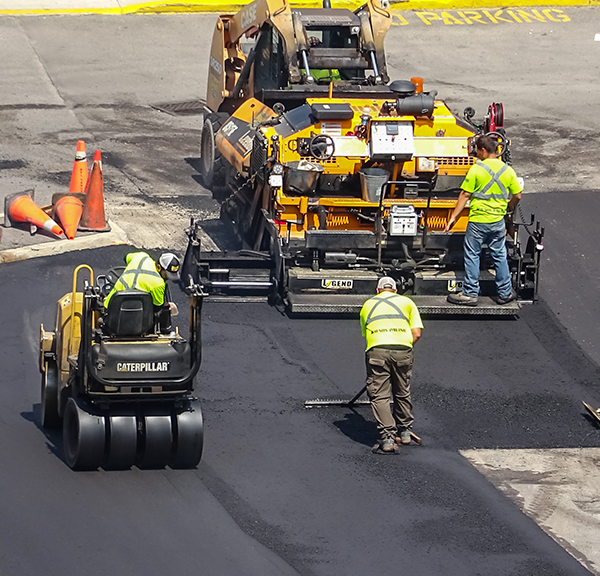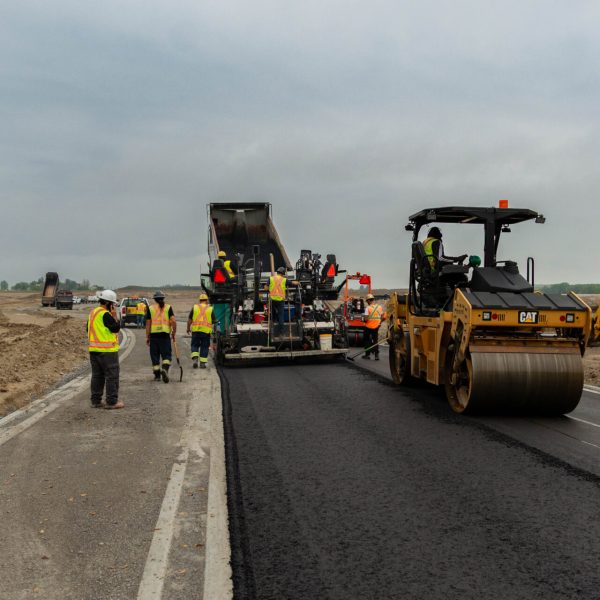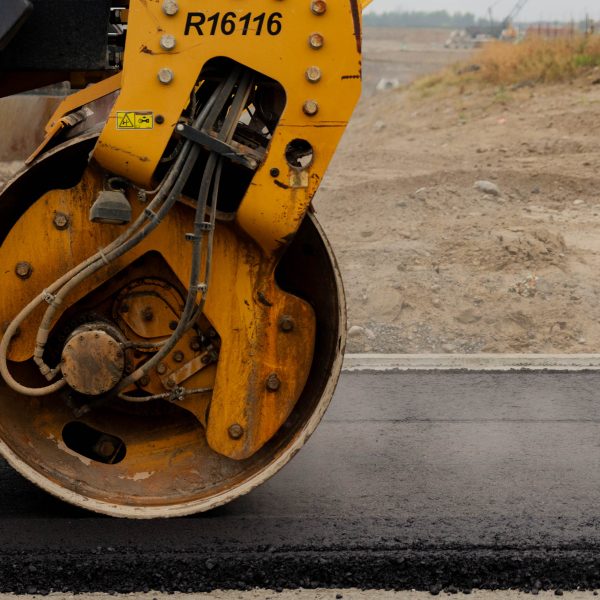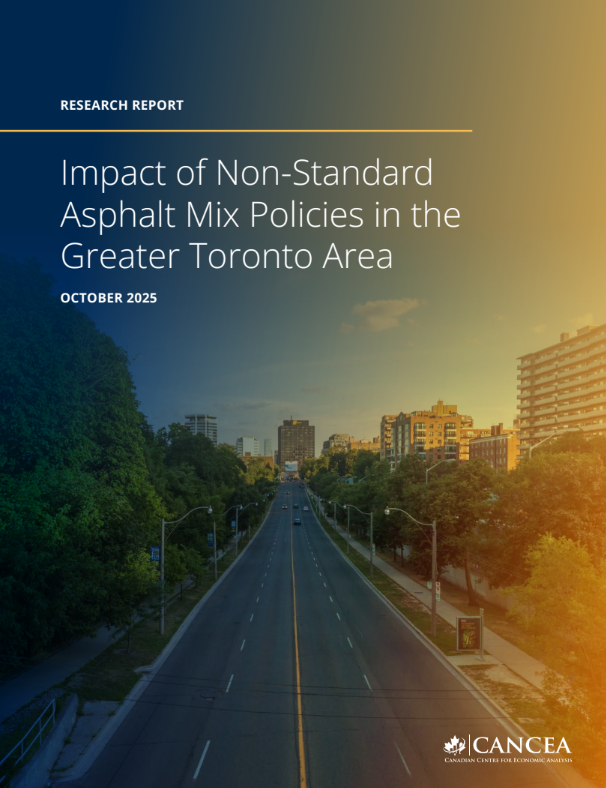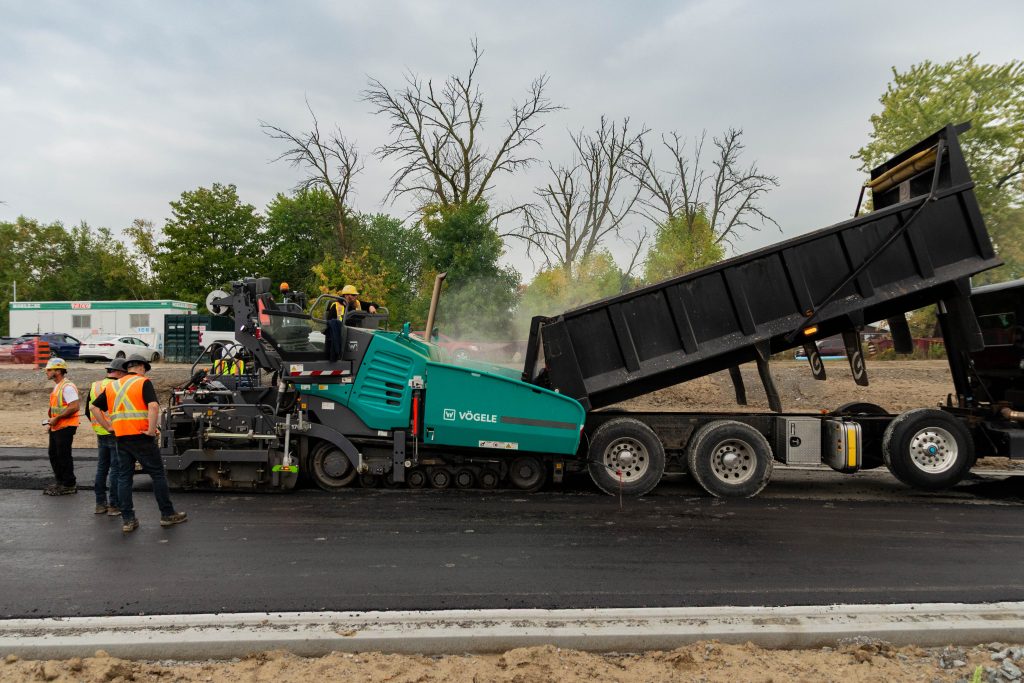
New Report Finds GTA Would Unlock Nearly $1 Billion in Savings Through Uniform Road Paving Standards
New analysis shows standardizing asphalt mix specifications across the Greater Toronto Area would boost productivity, protect local jobs, and deliver safer, longer-lasting roads without raising taxes.
Toronto, ON — As municipalities across the Greater Toronto Area (GTA) face mounting budget pressures, a new report from the Canadian Centre for Economic Analysis (CANCEA) shows that a simple change — standardizing asphalt mixes across the Greater Toronto Area — would unlock nearly $1 billion over the next decade.
Municipalities spend an average of 7.7% of their annual capital budgets on paving and repairing their roads, and each uses their own asphalt mix design. Those variations require suppliers to change materials, equipment, and testing procedures — sometimes dozens of times a day — leading to higher costs, lost productivity, and more waste. This is especially true in the GTA, where suppliers and contractors serve multiple municipal and regional markets that collectively require more than 300 asphalt mix designs.
Commissioned by the Toronto Area Road Builders Association (TARBA), the landmark study, “Impact of Non-Standard Asphalt Mix Policies in the Greater Toronto Area,” reveals that efficiency gains from standardizing municipal asphalt mixes and testing standards could pave 1,800 additional lane-kilometres of road — without a single new tax dollar — while protecting more than 3,000 local jobs and $140 million in wages.
“Municipalities are facing rising construction costs, infrastructure deficits, and tighter budgets,” said Raly Chakarova, Executive Director of TARBA. “We can’t afford inefficiencies built into the system itself. Harmonizing road building standards is a simple, evidence-based way to make every infrastructure dollar go further – building safer roads, supporting local jobs, and delivering more for our communities — without asking taxpayers for a penny more.”
KEY REPORT FINDINGS
- Unlock nearly $1 billion: Harmonizing asphalt standards within the GTA alone would unlock nearly $1 billion in value over the next decade.
- Inaction is costly: Failure to standardize will drain more than $500 million from municipal budgets in the next 10 years — money that could have paved more than 1,000 lane-kilometers — while a slow roll-out would forfeit 40% of potential benefits forever.
- Boost for small businesses: Cutting red tape and uncertainty reduces risk and waste, creating a more level playing field that boosts productivity and competitiveness for small and medium-sized businesses, who make up more than half of the asphalt industry in the GTA.
- Protecting local jobs and wages: Harmonization protects more than 3,000 GTA jobs and $140 million in wages, keeping economic benefits within the communities where asphalt is produced and laid.
- Bigger gains through broader standardization: Extending harmonization throughout all aspects of road building and procurement would unlock $11.7 billion in broader gains, help reduce the growing infrastructure deficit, and deliver safer, high-performing roads.
“This study shows asphalt harmonization is about economy-wide efficiency, not new public spending,” said Paul Smetanin, President and CEO of CANCEA. “It lets producers raise productivity and helps municipalities complete resurfacing and repairs more quickly, with no added cost to residents.”
While provincial standards exist and are managed through the Ontario Ministry of Transportation and the Municipal Engineering Association, Ontario’s 444 municipalities have discretion in their implementation and have instead amassed hundreds of varying requirements for how to build and procure similar use projects, like roads, bridges, sewers, and watermains. These differences cost taxpayers millions of dollars more, while reducing quality and productivity and increasing waste and carbon emissions. When every municipality builds to the same proven standard, Ontario gets safer, greener, more cost-effective roads — faster.
Media Relations
For media inquiries, please contact Raly Chakarova, Executive Director, Toronto and Area Road Builders Association (TARBA) at [email protected] and [email protected].
About CANCEA
The Canadian Centre for Economic Analysis (CANCEA) is an independent, interdisciplinary socio‑economic analytics and advisory firm that supports evidence‑based decisions across government, industry, and the social sector. CANCEA is home to Canada’s largest and most integrated socio‑economic simulation platform, widely used for policy evaluation, delivering rigorous, data‑driven insights from the household to the national level. Trusted for more than 20 years, CANCEA applies advanced agent‑based modelling and forecasting to help leaders assess impacts, manage risk, and plan for inclusive, sustainable growth.
About TARBA
The Toronto and Area Road Builders Association (TARBA) represents unionized contractors building multi-modal transportation infrastructure, including roads, transit, highways, bike lanes, and sidewalks, in the Greater Toronto Area and Simcoe County. TARBA advocates for policies and practices that promote safe, cost-efficient, and sustainable infrastructure development.
WHAT REGIONAL LEADERS ARE SAYING

“We are an integrated region, but a patchwork of overly burdensome rules and regulations create barriers that drive up costs and timelines. The CANCEA report demonstrates this clearly in road construction—if the asphalt mix and testing standards are good enough for one part of the Toronto region, there’s no reason they should not be accepted across the region. Adopting region-wide best-in-class standards is a sensible way to simplify and streamline regulations, not just for road construction, but across sectors.”
– Toronto Region Board of Trade
“It’s time for municipalities to standardize asphalt mixes & testing standards. This would create efficiencies that will stabilize supply chains, speed up construction of new roads, protect jobs, and save taxpayers billions of dollars. Read the report and support the call to action.”
– Sandro Perruzza, CEO of Ontario Society of Professional Engineers


“The report highlights opportunities for significant efficiencies for road infrastructure that would benefit municipalities — and Canadians. Harmonizing standards, encouraging innovation, and emphasizing the need for strategic investment is how we build a stronger Canada, together.”
– Canadian Construction Association
“RCCAO welcomes and commends this new important infrastructure research released by TARBA. It will further support our advocacy call for greater provincial leadership to harmonize municipal standards across Ontario to improve industry operations and our communities.”
– Residential and Civil Construction Association of Ontario
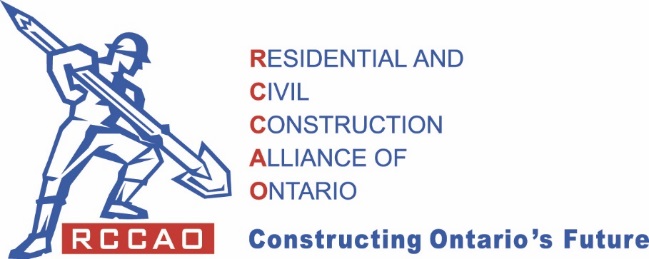
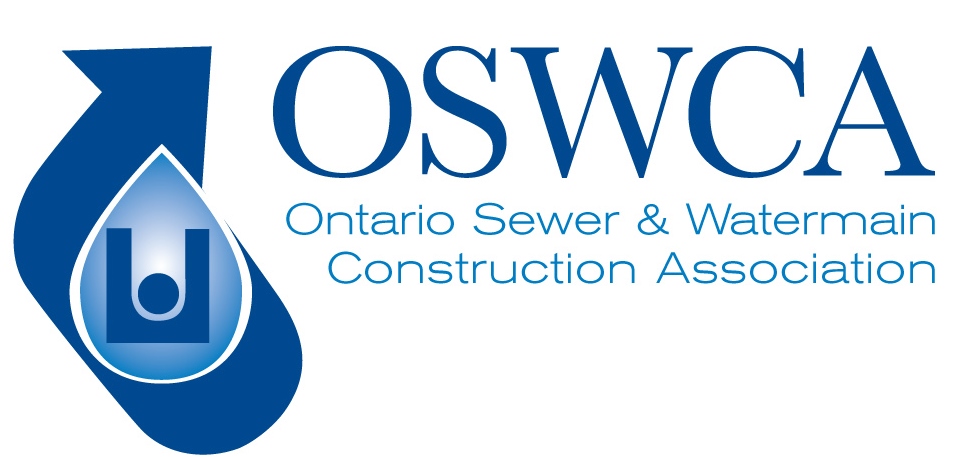
“Standardizing specifications can have a huge impact on municipal infrastructure. It can make capital construction dollars go further, speed up project design and delivery, and improve quality and performance by creating greater economies of scale. Big potential for long-term gains on this.”
– Patrick McManus, Executive Director of Greater Toronto Sewer and Watermain Contractors Association
“Good Roads welcomes TARBA’s new report highlighting the benefits of harmonizing asphalt standards. Greater consistency in roadbuilding practices helps municipalities achieve better value for money and ensures the long-term quality of our local infrastructure.”
– Scott Butler, Executive Director of Good Roads


“This recent CANCEA report highlights a transformative opportunity for the Greater Toronto Area and the province of Ontario to harmonize road construction and safety standards. By modernizing and achieving greater consistency and uniformity in technical standards, we can reduce cost and expedite construction, delivering safer, longer-lasting roads. Embracing comprehensive road construction and safety standardization is a vital step to providing resilient infrastructure for our growing communities.”
– Jackie Choquette, Head of Government Affairs at 3M Canada
